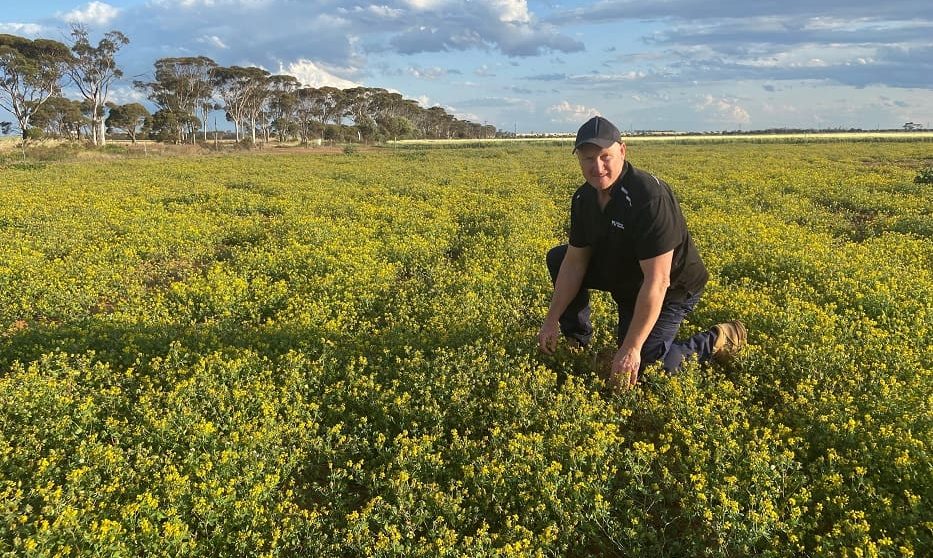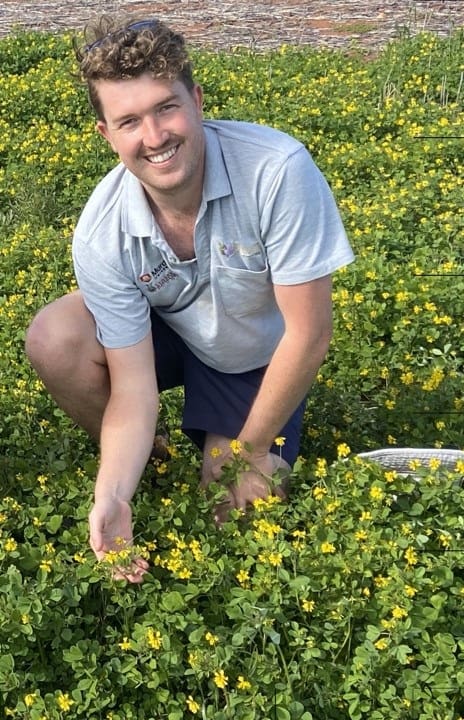
DPIRD and Murdoch University principal research scientist and WAARC HALO project lead Dr Ron Yates inspects a
Trigonella paddock near the WA wheatbelt town of Narembeen.
A NEW header-harvestable crop-pasture legume suited to mildly acidic-alkaline soils in low-medium rainfall areas has been developed in Western Australia.
WA Agricultural Research Collaboration scientists have finalised development of the world’s first cultivar of the legume pasture species, Trigonella balansae, suited to WA’s wheatbelt region, and it has also performed well in New South Wales trials.
The new Trigonella cultivar, named Carn2ac, was developed under WAARC’s Harvestable Annual Legume Options (HALO) project which had co-investment from the Grains Research and Development Corporation.
DPIRD said Carn2ac is suited to mildly acidic-alkaline soils in Western Australia’s low-medium rainfall zones, delivering an exciting alternative to annual medics and clovers because the seed is less expensive and header harvestable.
WAARC and DPIRD research scientist Rob Harrison said the new cultivar would give wheatbelt farmers an inexpensive, drought-proofing pasture option by increasing fodder production, boosting nitrogen fixation and enabling farmers to produce and harvest their own seed on farm.
“The availability of header harvestable seed gives farmers the option of growing an alternative legume to lupins, medics and clovers, that will increase biologically fixed nitrogen in the farming system and cut fertiliser costs, thereby boosting grain yield and protein in subsequent crops.
“Incorporating legumes into crop rotations also allows growers to improve management of weeds, pests and diseases with flow-on benefits for the environment,” Mr Harrison said.
It has taken years of collaborative research efforts by various project teams to domesticate this species – the first work was done in the early 2000’s which identified the adaptation of Trigonella to Western Australia.
Carn2ac has also shown potential in NSW
Carn2ac has also shown significant potential in New South Wales where it has been grown at Condobolin and Wagga Wagga in replicated research trials. Here, it has performed well in summer sowing using unscarified seed and when conventionally sown in mid to late autumn using scarified seed, according to NSW-based agronomist Dr Belinda Hackney.
Carn2ac follows the release of two other pasture cultivars in the past five years – French Serradella (Fran2o) in 2020 for low-medium rainfall sandy soils, and Bladder Clover (Diaman2ti) in 2023 for low-medium rainfall where annual medics are suited. These new releases have also performed well in central and southern NSW in replicated trials and commercial sowings. Demonstration sites will be established in Victoria this year.
The legume development followed five years of funding in the Dryland Legume Pasture System funded by GRDC, Meat and Livestock Australia and Australian Wool Innovation prior to HALO, where it was evaluated. It was also evaluated previously under the National Annual Legume Pasture Improvement Program in the early 2000s with the same three co-investors.
Proving header harvestability was a key development

WAARC Harvestable Annual Legume Options project and DPIRD research scientist Rob Harrison inspects a Trigonella paddock near WA mid-west town Canna.
Mr Harrison said building on previous research knowledge, the HALO team was excited to discover key information that proved the new legume cultivar could be harvested in commercial quantities with a farmer’s header.
“Narembeen farmer Clinton Butler grew Carn2ac on his property last year and he managed to harvest the seed with his cereal header producing 250kg per hectare, which is amazing for a pasture legume.”
WAARC director Kelly Pearce congratulated the HALO project team for their research excellence and dedication to developing the world’s first domesticated Trigonella balansae legume cultivar.
“This outstanding achievement delivers a header-harvestable, low-cost legume option tailored to low-to-medium rainfall producers across the Wheatbelt, offering transformative benefits for WA farmers,” Dr Pearce said.
“Whether for continuous cropping or mixed farming systems with livestock, this practical new pasture variety addresses the real-world challenge of enhancing biological nitrogen input, providing a valuable alternative for improving agricultural productivity.
The HALO research team brings together several WAARC members including Murdoch University, the Department of Primary Industries and Regional Development and CSIRO for their combined expertise in pasture legume breeding, agronomy and bio-economic modelling.
Mr Harrison said by bringing together funding partners and multidisciplinary collaborators, WAARC is driving industry-led agricultural research and development, and delivering innovative solutions to WA’s unique challenges and opportunities.”
“If nitrogen fixation from legumes can fully replace artificial nitrogen from fertilisers, then the carbon footprint of cropping is significantly reduced, leading to more profitable and sustainable farming systems for growers,” he said.
GRDC managing director Nigel Hart said GRDC supported projects that investigated the contribution of legume crops through biological nitrogen fixation.
“These projects offer significant benefits to growers in the long-term sustainability and profitability of their grain crop production systems,” he said.
The HALO team will continue focusing their research efforts on improved cultivars of harvestable annual legumes, integrating more legumes into farming systems to increase nitrogen fixation in the soil, and better understanding legume-herbicide interactions and the profitability of legumes in WA’s rainfall zones.
For more information contact Clint Butler at Narembeen on 0429 647 335.
For more details on Carn2ac click here.
For more details on Diaman2ti click here.

HAVE YOUR SAY